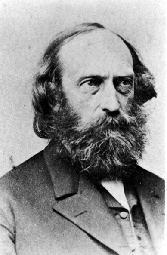Stephen Pearl Andrews
Stephen Pearl Andrews | |
|---|---|
 | |
| Born | (1812-04-22)April 22, 1812 |
| Died | May 21, 1886(1886-05-21) (aged 74) New York City, US |
| Occupation(s) | Activist, journalist, philosopher, writer |
| Known for | American individualist anarchist and outspoken abolitionist |
| Part of a series on |
| Libertarian socialism |
|---|
 |
Stephen Pearl Andrews (1812–1886) was an American libertarian socialist, individualist anarchist, linguist, political philosopher, and outspoken abolitionist.
Life
[edit]By the end of the 1840s, Andrews began to focus his energies on utopian communities. Fellow individualist anarchist Josiah Warren was responsible for Andrew's conversion to radical individualism and in 1851 they established Modern Times in Brentwood, New York. He was elected an Associate Fellow of the American Academy of Arts and Sciences in 1846.[1] In 1857, Andrews established the Unitary Homes on East 14 St. and Stuyvesant St. in New York City.[2]
Thought
[edit]In the 1870s, Andrews promoted Joseph Rodes Buchanan's psychometry besides his own universology predicting that a priori derived knowledge would supersede empirical science as exact science.[3] Andrews was also considered a leader in the religious movement of spiritualism.[4] Anarcho-syndicalist Rudolf Rocker called Andrews a significant exponent of libertarian socialism in the United States.[5]
Andrews' individualist anarchism is a form of economic mutualism.[6]
Works
[edit]- The Phonographic Reader: A Complete Course of Inductive Reading Lessons in Phonography (1846), with Augustus Boyle
- Cost the Limit of Price (1851)
- The true Constitution of Government in the Sovereignty of the Individual (1851)[7]
- The Science of Society (1851)
- The Sovereignty of the Individual (1853)
- Discoveries in Chinese or the Symbolism of the Primitive Characters (1854)
- Principles of Nature, Original Physiocracy, the New Order of Government (1857)
- The Pantarchy (1871)
- The Primary Synopsis of Universology and Alwato: The New Scientific Universal Language (1871)
- The Basic Outline of Universology (1872)
- The Primary Grammar of Alwato (1877)
- The Labor Dollar (1881)
- Elements of Universology (1881)
- The New Civilization (1885)
Notes
[edit]- ^ "Book of Members, 1780–2010: Chapter A" (PDF). American Academy of Arts and Sciences. Retrieved April 18, 2011.
- ^ https://timesmachine.nytimes.com/timesmachine/1859/07/07/issue.html
- ^ "A discourse on Seven Sciences.; Cerebral Physiology, Cerebral Psychology, Sarcognomy, Psychometry, Pneumatology, Pathology, and Cerebral Pathology". The New York Times. March 17, 1878. Retrieved March 31, 2019.
- ^ "Stephen Pearl Andrews.; Death of the Well Known Abolitionist, Philosopher, and Linguist". The New York Times. May 23, 1886. Retrieved March 31, 2019.
- ^ Rocker, Rudolf (1949). Pioneers of American Freedom. New York: J. J. Little and Ives Co. pp. 85.
- ^ Martin, James J. (1970). Men Against the State. Colorado Springs: Ralph Myles Publisher. p. 44.
- ^ "The science of society". 1888.
Further reading
[edit]- Stern, Madeleine (1968). The Pantarch: A Biography of Stephen Pearl Andrews. University of Texas Press.
External links
[edit] Media related to Stephen Pearl Andrews at Wikimedia Commons
Media related to Stephen Pearl Andrews at Wikimedia Commons
| Concepts |
| ||||||
|---|---|---|---|---|---|---|---|
| Issues | |||||||
| Schools of thought |
| ||||||
| Types of federation | |||||||
| Economics | |||||||
| Culture | |||||||
| History | |||||||
| People | |||||||
| Lists | |||||||
| By region | |||||||
| Related topics | |||||||
| Origins | |||||||
|---|---|---|---|---|---|---|---|
| Schools |
| ||||||
| Concepts |
| ||||||
| Philosophers |
| ||||||
| Politicians | |||||||
| Issues | |||||||
| Works |
| ||||||
| Related |
| ||||||
| Schools of thought | |||||
|---|---|---|---|---|---|
Concepts | |||||
Models | |||||
People |
| ||||
| Significant events | |||||
Related | |||||
| Schools of thought |
| ||||||||||
|---|---|---|---|---|---|---|---|---|---|---|---|
| Key topics and issues |
| ||||||||||
| Concepts |
| ||||||||||
| People |
| ||||||||||
| Organizations | |||||||||||
| See also | |||||||||||
| History |
| ||||||||||
|---|---|---|---|---|---|---|---|---|---|---|---|
| Parties and organizations |
| ||||||||||
| People |
| ||||||||||
| Literature | |||||||||||
| Related topics |
| ||||||||||
| International | |
|---|---|
| National | |
| Academics | |
| Other | |
- 1812 births
- 1886 deaths
- 19th-century American journalists
- 19th-century American male writers
- 19th-century American non-fiction writers
- American abolitionists
- American anarchists
- American magazine editors
- American male journalists
- American male non-fiction writers
- American political philosophers
- American political writers
- American spiritualists
- Anarchist writers
- Fellows of the American Academy of Arts and Sciences
- Free love advocates
- Individualist anarchists
- Libertarian socialists
- Linguists from the United States
- Mutualists
- People from Templeton, Massachusetts
- Philosophy writers
- Writers from Massachusetts
- Articles with short description
- Short description is different from Wikidata
- Use American English from June 2024
- All Wikipedia articles written in American English
- Use mdy dates from June 2024
- Articles with hCards
- Pages using sidebar with the child parameter
- Commons link from Wikidata
- Articles with excerpts
- Articles with FAST identifiers
- Articles with ISNI identifiers
- Articles with VIAF identifiers
- Articles with WorldCat Entities identifiers
- Articles with CANTICN identifiers
- Articles with GND identifiers
- Articles with J9U identifiers
- Articles with KBR identifiers
- Articles with LCCN identifiers
- Articles with NTA identifiers
- Articles with PLWABN identifiers
- Articles with CINII identifiers
- Articles with SNAC-ID identifiers

